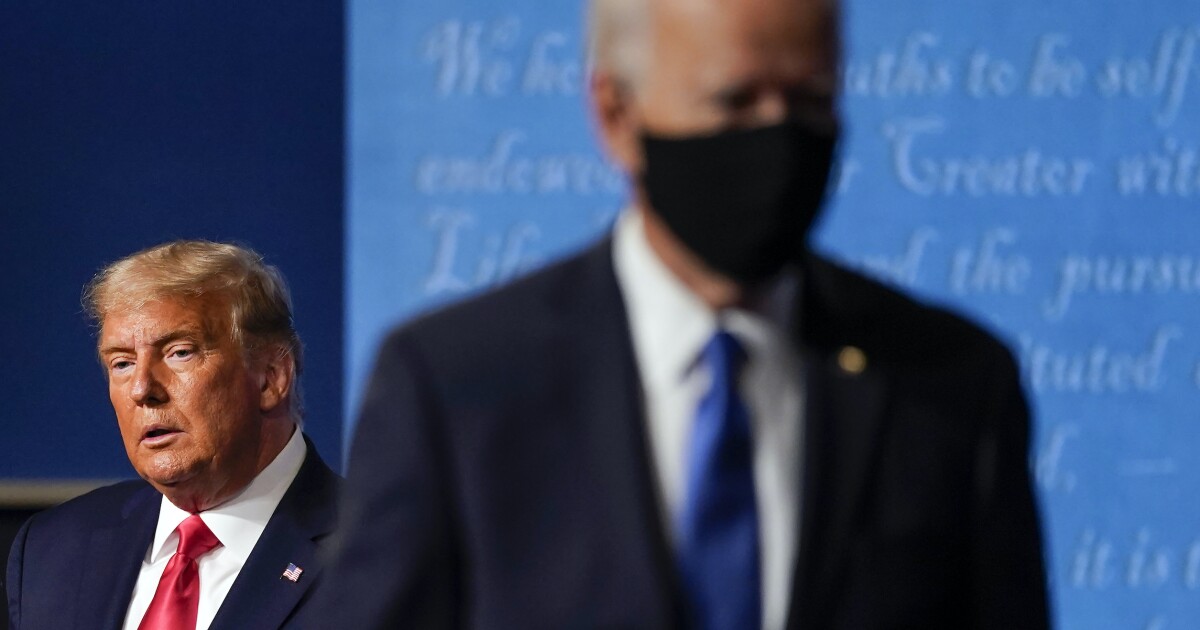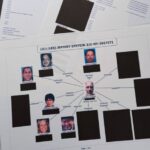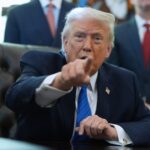

President Joe Biden was briefed in 2016 about an alleged plan by Hillary Clinton to tie former President Donald Trump to Russia to distract from her own use of an illicit private email server while secretary of state, according to special counsel John Durham.
Durham’s new 306-page report harshly criticized the FBI’s “Crossfire Hurricane” investigation into baseless claims of collusion between Trump and Russia during the 2016 presidential campaign. Durham found the bureau’s rush to investigate Trump was “markedly different from the FBI’s actions with respect to other highly significant intelligence it received from a trusted foreign source pointing to a Clinton campaign plan to vilify Trump by tying him to Vladimir Putin.”
SUPREME COURT COULD WADE INTO DEBT CEILING FIGHT
Biden, while President Barack Obama’s vice president, was briefed on what Durham dubbed the “Clinton Plan intelligence” in the summer of 2016. The intelligence concerned the purported “approval by Hillary Clinton on July 26, 2016 of a proposal from one of her foreign policy advisers” to “stir up a scandal” against Trump by “tying him” to “Putin and the Russian hacking of the Democratic National Committee.”
Durham noted that the intelligence community “does not know the accuracy of this allegation or the extent to which the Russian intelligence analysis may reflect exaggeration or fabrication,” but he provided evidence he suggested lent credibility to the analysis.
“Unlike the FBI’s opening of a full investigation of unknown members of the Trump campaign based on raw, uncorroborated information, in this separate matter involving a purported Clinton campaign plan, the FBI never opened any type of inquiry, issued any taskings, employed any analytical personnel, or produced any analytical products in connection with the information,” Durham wrote. “This lack of action was despite the fact that the significance of the Clinton Plan intelligence was such as to have prompted the Director of the CIA to brief the President, Vice President, Attorney General, Director of the FBI, and other senior government officials about its content within days of its receipt.”
Then-Obama CIA Director John Brennan briefed Obama and others on the intelligence, and Durham noted that “it was also of enough importance for the CIA to send a formal written referral memorandum” in early September 2016 to since-fired FBI Director James Comey and then-FBI special agent Peter Strzok for their consideration and action, asking them to look into claims that Clinton had approved a plan concerning Trump and Russia “as a means of distracting the public from her use of a private mail server.”
Durham said the Clinton Plan was relevant to his investigation for two main reasons: first because the Clinton Plan intelligence “arguably suggested that private actors affiliated with the Clinton campaign were seeking in 2016 to promote a false or exaggerated narrative to the public and to U.S. government agencies about Trump’s possible ties to Russia” and second because “it was part of the mosaic of information that became known to certain U.S. officials at or before the time they made critical decisions in the Crossfire Hurricane case and in related law enforcement and intelligence efforts.”
Durham said the U.S. spy community received the Clinton Plan intelligence in late July 2016 and that “the official who initially received the information immediately recognized its importance including its relevance to the U.S. presidential election.” Brennan soon “personally received a copy of the intelligence.” Brennan then met with Obama on July 28 and Comey on July 29.
Brennan then met with Obama, Biden, Comey, and others on Aug. 3 and briefed them all on “relevant intelligence known to date on Russian election interference, including the Clinton Plan intelligence.”
In 2020, John Ratcliffe, Trump’s director of national intelligence, declassified handwritten notes from Brennan showing he briefed Obama on the Clinton Plan. Brennan claimed at the time that Ratcliffe’s actions were “appalling.” Ratcliffe told the Washington Examiner at the time that “this is not Russian disinformation and has not been assessed as such by the intelligence community.”
Durham was unable to figure out when the FBI (besides Comey) received the Clinton Plan intelligence but concluded it was no later than Aug. 22, 2016, when an FBI cyber analyst emailed several FBI employees, including supervisory intelligence analyst Brian Auten and Section Chief Jonathan Moffa, both senior intelligence analysts on the Crossfire Hurricane team, a summary of the contents of the Clinton Plan intelligence.
The special counsel “did not identify any replies or follow-up actions taken by FBI personnel as a result of this email.”
The CIA sent its referral memo to the FBI on Sept. 7, 2016, but “none of the FBI personnel who agreed to be interviewed could specifically recall receiving this Referral Memo, nor did anyone recall the FBI doing anything in response to the Referral Memo.”
Durham “did not identify any further actions that the CIA or FBI took in response to this intelligence product as it related to the Clinton Plan intelligence” and “located no evidence that in conducting the Crossfire Hurricane investigation the FBI considered whether and how the Clinton Plan intelligence might impact the investigation.”
The special counsel said, “No FBI personnel who were interviewed … recalled Crossfire Hurricane personnel taking any action to vet the Clinton Plan intelligence.” Durham said, “This stands in sharp contrast to its substantial reliance on the uncorroborated Steele Reports, which at least some FBI personnel appeared to know was likely being funded or promoted by the Clinton campaign.”
The Clinton Plan intelligence also was not provided to the Justice Department attorneys working on Foreign Intelligence Surveillance Act matters related to Crossfire Hurricane, nor was it disclosed to the FISA court.
Marc Elias, who started the Elias Law Group in 2021, was the Clinton campaign’s general counsel in 2016 and hired the opposition research firm Fusion GPS, which hired British ex-spy Christopher Steele in 2016. Elias met with Steele in 2016 and previously said he was aware of Fusion’s plans to have the discredited dossier author brief reporters to influence the 2016 presidential campaign between Trump and Clinton. Elias also coordinated closely with Democratic cybersecurity lawyer Michael Sussmann, his former Perkins Coie law firm colleague, on anti-Trump research in 2016.
Sussmann had been charged by Durham after allegedly concealing his two clients, Neustar chief technology officer Rodney Joffe and Clinton’s campaign, from FBI General Counsel James Baker when he pushed debunked allegations of a secret line of communication between the Trump Organization and Russia’s Alfa Bank during a September 2016 meeting. But a jury found Sussmann not guilty of the false statement charge following a trial in the nation’s capital last year.
Clinton campaign manager Robby Mook testified during the Sussmann trial he was “briefed about the Alfa-Bank issue first” by Elias in the summer of 2016. Mook said, “I discussed it with Hillary as well” after the campaign team had discussed it. Mook said, “She agreed with the decision” to share the Alfa Bank claims with the media and said, “She thought we made the right decision.”
Durham also charged Russian analyst Igor Danchenko, the main source for Steele’s discredited dossier, with misleading about the sourcing for dossier claims, including related to the baseless allegations of a well-developed conspiracy of cooperation between Trump and the Russians, which the special counsel said is false. Danchenko was found not guilty last year.
Many FBI personnel involved with Crossfire Hurricane had never seen the Clinton Plan intelligence until Durham’s team showed it to them, and “some expressed surprise and dismay upon learning of it,” the report found.
The special counsel said, “Supervisory Special Agent-1 … became visibly upset and emotional, left the interview room with his counsel, and subsequently returned to state emphatically that he had never been apprised of the Clinton Plan intelligence and had never seen the aforementioned Referral Memo.” The agent “expressed a sense of betrayal that no one had informed him of the intelligence” and told Durham’s team that “regardless of whether its contents were true, he should have been informed of it.”
Baker also told Durham’s team “that he had neither seen nor heard of the Clinton Plan intelligence or the resulting Referral Memo prior to his interview” and said, “Had he known of it during the Crossfire Hurricane investigation, he would have viewed in a different and much more skeptical light” both the Steele dossier and Sussmann’s Alfa Bank claims.
Jake Sullivan, the Clinton campaign senior policy adviser and now Biden’s national security adviser, told Durham’s team that he had not seen the intelligence reporting before and had no reaction to it other than to say, “That’s ridiculous.” Clinton campaign chairman John Podesta told Durham that the claims were “ridiculous” and denied the campaign was involved in any such “plan.” Jennifer Palmieri, the Clinton campaign’s communications director, also called it “ridiculous.”
The special counsel argued that the FBI should have considered whether claims pushed or funded by the Clinton campaign, such as the Steele dossier and the Alfa Bank allegations, were in reality “part of a political effort to smear a political opponent and to use the resources of the federal government’s law enforcement and intelligence agencies in support of a political objective.”
Durham’s report argued that Clinton campaign internal discussions and external actions, including “the campaign’s funding of the Steele Reports and Alfa Bank allegations, provide some additional support for the credibility to the information set forth in the Clinton Plan intelligence.”
The special counsel provided just a “sampling” of emails about Trump campaign associate Carter Page that the “Clinton/DNC-funded” Fusion GPS sent to the media in the summer and fall of 2016.
“The aforementioned facts reflect a rather startling and inexplicable failure to adequately consider and incorporate the Clinton Plan intelligence into the FBI’s investigative decisionmaking in the Crossfire Hurricane investigation,” the Durham report concluded. “Whether or not the Clinton Plan intelligence was based on reliable or unreliable information, or was ultimately true or false, it should have prompted FBI personnel to immediately undertake an analysis of the information and to act with far greater care and caution when receiving, analyzing, and relying upon materials of partisan origins, such as the Steele Reports and the Alfa Bank allegations.”
Durham also detailed how differently the FBI handled other similar Clinton-related controversies that could affect the election but that were all treated with “caution” by the FBI.
“The speed and manner in which the FBI opened and investigated Crossfire Hurricane during the presidential election season based on raw, unanalyzed, and uncorroborated intelligence also reflected a noticeable departure from how it approached prior matters involving possible attempted foreign election interference plans aimed at the Clinton campaign,” Durham wrote.
CLICK HERE TO READ MORE FROM THE WASHINGTON EXAMINER
Despite devoting nearly 20 pages of the Durham report to the Clinton Plan, the special counsel did not charge anyone related to it.
“In sum, the government’s handling of the Clinton Plan intelligence may have amounted to a significant intelligence failure and a troubling instance in which confirmation bias and a tunnel-vision pursuit of investigative ends may have caused government personnel to fail to appreciate the extent to which uncorroborated reporting funded by an opposing political campaign was intended to influence rather than inform the FBI,” Durham said. “It did not, all things considered, however, amount to a provable criminal offense.”





